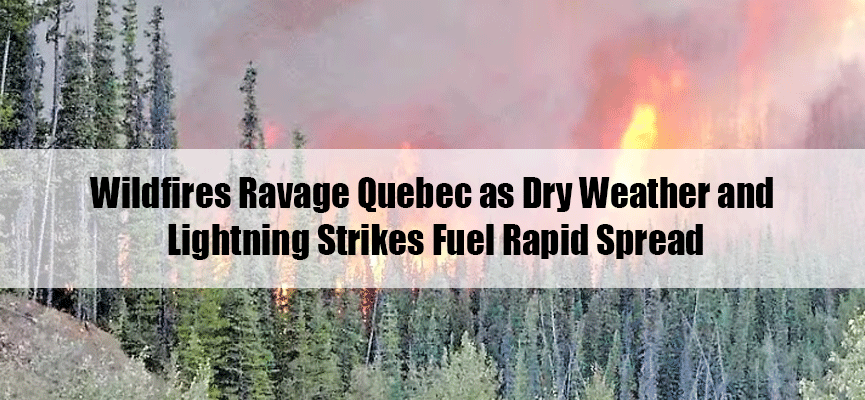In early June, the Canadian province of Quebec was engulfed in a relentless wave of wildfires, shrouding a vast expanse of eastern North America in thick smoke. The fires, which seemingly spread overnight, were exacerbated by the combination of dry and hot weather conditions and numerous lightning strikes.
The situation escalated rapidly at the beginning of the month when wildfires multiplied from 36 to over 100 following a powerful thunderstorm on June 1st. Philippe Bergeron, a representative from Quebec’s firefighting agency, described the situation as a sudden and dramatic turn of events: “Within three days, everything went very bad.”
The intensifying flames have strained local firefighting resources, prompting the arrival of international assistance. Firefighters from around the world have been arriving in Quebec to combat the raging infernos, with approximately 110 firefighters from France scheduled to join the efforts. Additional support has already been dispatched from the nearby province of New Brunswick.
According to Mr. Bergeron, this influx of external aid will significantly impact the local firefighters who have been grappling to contain the blazes. Many of them have been working grueling 14-hour shifts that commence at sunrise. Without this assistance, Quebec’s local firefighting capabilities would only be able to handle approximately 25 to 35 large forest fires simultaneously.
Presently, Quebec has approximately 250 local firefighters available each year to combat wildfires. However, Quebec Premier Francois Legault asserted that a total of 1,200 firefighters would be required to effectively combat the ongoing fires. In response to this unprecedented need, the province swiftly trained an additional 300 individuals in Quebec City over the past week, ensuring their prompt deployment.
The United States has also pledged support, dispatching an additional 600 firefighters to Canada. Approximately 100 of them are expected to arrive in Quebec the following week, as stated by Mr. Bergeron.
Unprecedented Wildfire Outbreak Engulfs Quebec, Merging Fires Pose New Challenge
The number of fires in Quebec has slightly decreased from 150 to 137 as of Thursday. Nevertheless, a new hurdle has emerged as some fires have grown so large that they are now merging with others, intensifying the situation further.
These wildfires of such magnitude are unparalleled in Quebec’s history, as they are more commonly associated with regions in western Canada, like Alberta and British Columbia. Currently, over 280,000 hectares (691,900 acres) of land in the eastern province have been consumed by the relentless flames.
The turning point for Quebec’s wildfire season occurred following the thunderstorm on June 1st. Mr. Bergeron vividly described the aftermath, stating, “Within one day, there was fire everywhere.” As a result, nearly 15,000 people in central Quebec have been forced to evacuate their homes.
The situation is not unique to Quebec alone, as fires continue to rage across various parts of Canada. In addition to Quebec, Alberta, British Columbia, Nova Scotia, and the Northwest Territories are also battling significant wildfires. The scale of the ongoing crisis has prompted federal officials to warn that this could potentially become Canada’s worst wildfire season on record. Astonishingly, the burned area has already surpassed four million hectares (9.8 million acres), roughly twelve times the 10-year average for this time of year.
The severity of this wildfire season has ignited discussions among politicians regarding the establishment of a national fire service. Currently, Canada relies on resource-sharing among provinces and assistance from neighboring US states to combat wildfires.

